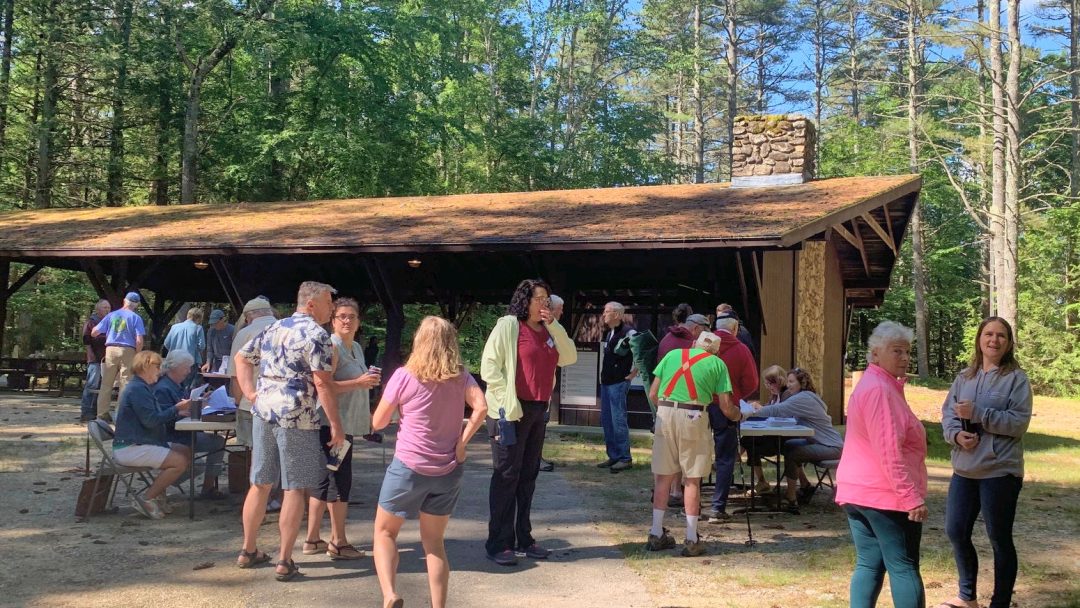On June 8, 2024, fair, bright skies welcomed over a hundred members and friends to the Pawtuckaway Lake Improvement Association’s Annual Meeting at the State Park Pavilion.
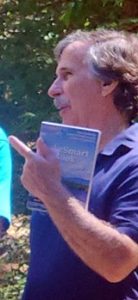
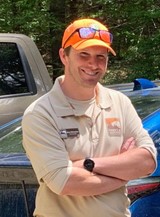
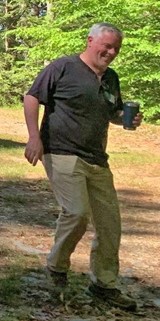 We were joined by State Representative Hal Rafter, State Park Manager Dave Richardson, Nottingham Budget Committee member Charlotte Fyfe, and Nottingham Board of Selectmen member John Morin.
We were joined by State Representative Hal Rafter, State Park Manager Dave Richardson, Nottingham Budget Committee member Charlotte Fyfe, and Nottingham Board of Selectmen member John Morin.
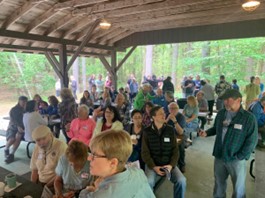 A large group gathered inside the Pavilion
A large group gathered inside the Pavilion 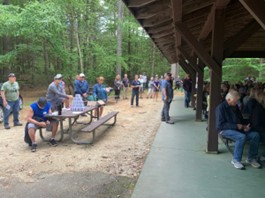 to schmooze and listen. There was a spillover crowd enjoying the sun outdoors.
to schmooze and listen. There was a spillover crowd enjoying the sun outdoors.
 PLIA President Steve Soreff opened the meeting with an introduction of Board members and a farewell to departing Board member Peter White, who has served for many years as the Chair of the Road Clean Up Committee and will be missed. He then called for a vote for the slate of nominees to the Board, including member Gary Potavin who has volunteered to join the Board. PLIA members voted unanimously for the nominees.
PLIA President Steve Soreff opened the meeting with an introduction of Board members and a farewell to departing Board member Peter White, who has served for many years as the Chair of the Road Clean Up Committee and will be missed. He then called for a vote for the slate of nominees to the Board, including member Gary Potavin who has volunteered to join the Board. PLIA members voted unanimously for the nominees.
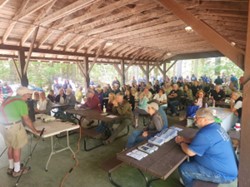 Steve then reviewed the work of the organization last year, which included two victorious campaigns: (1) eradicate milfoil in the lake and (2) persuade the State to expend ARPA funds on infrastructure like bath houses and septic systems rather than on the construction of 35 new RV campsites along the shorefront. He noted that it was the support and participation of PLIA members that brought each of these efforts to a successful conclusion.
Steve then reviewed the work of the organization last year, which included two victorious campaigns: (1) eradicate milfoil in the lake and (2) persuade the State to expend ARPA funds on infrastructure like bath houses and septic systems rather than on the construction of 35 new RV campsites along the shorefront. He noted that it was the support and participation of PLIA members that brought each of these efforts to a successful conclusion.
Looking forward, Program Chairs summarized their missions and laid out plans for the coming season.
- Neil Santos, Milfoil Team Chair, emphasized that despite the widespread
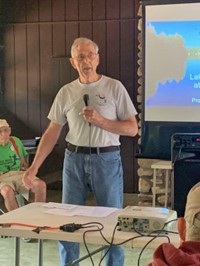 eradication of this invasive weed last year, it would be necessary to search for and remove new or recurring milfoil growths this summer. This work has already begun, and he invited additional Weed Control Divers to join his team. He also mentioned the presence of other invasive species threatening NH lakes and acknowledged the importance of Weed Watchers and Lake Hosts as early detection agents crucial to our overall mission.
eradication of this invasive weed last year, it would be necessary to search for and remove new or recurring milfoil growths this summer. This work has already begun, and he invited additional Weed Control Divers to join his team. He also mentioned the presence of other invasive species threatening NH lakes and acknowledged the importance of Weed Watchers and Lake Hosts as early detection agents crucial to our overall mission. - Steve Soreff, donning his Weed Watcher Co-Chair hat, reported on the successful online training of volunteers provided by Amy Smagula of NH DES. This video has been recorded and is available for any new or returning volunteers to watch. He recommended that anyone who boats on the lake could and should be a Weed Watcher.
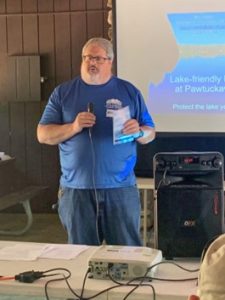 Next it was Bruce Henden’s turn to summarize the work of the Lake Host Program which he coordinates and manages. It is designed to provide courtesy boat inspections and public education about 0063 aquatic invasive species. He explained the need for one more Lake Host to cover Saturday afternoons at the Fundy boat ramp and acknowledged that finding people to fill these paid positions has been challenging. Bruce listed invasive species that are becoming greater threats to Pawtuckaway and urged fishermen and boaters to learn about them. Finally, he brought NH LAKES LakeSmart pamphlets to share with everyone at the meeting to explain how property management affects nutrients that enter the lake and enhance growth of all aquatic species.
Next it was Bruce Henden’s turn to summarize the work of the Lake Host Program which he coordinates and manages. It is designed to provide courtesy boat inspections and public education about 0063 aquatic invasive species. He explained the need for one more Lake Host to cover Saturday afternoons at the Fundy boat ramp and acknowledged that finding people to fill these paid positions has been challenging. Bruce listed invasive species that are becoming greater threats to Pawtuckaway and urged fishermen and boaters to learn about them. Finally, he brought NH LAKES LakeSmart pamphlets to share with everyone at the meeting to explain how property management affects nutrients that enter the lake and enhance growth of all aquatic species.- Pam Kelly, Communications Chair, invited anyone not currently getting
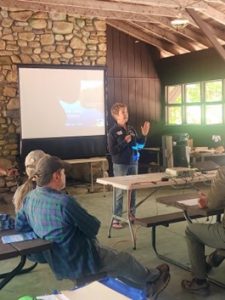 our email news blasts to provide their email address so they can be added to our contact list. She emphasized that storm runoff is a major source of pollutants in our lake water and urged the audience to enroll in the LakeSmart Program mentioned by Bruce. All Board members have pledged to get an evaluation of their property through this Program to discover how they can make improvements to prevent runoff. It is free, confidential, and enormously helpful in making us all lake-friendly. Already, 30 Pawtuckaway households have signed up! Finally, she offered signs provided by the State Park to be posted on islands reminding visitors that no campfires are allowed.
our email news blasts to provide their email address so they can be added to our contact list. She emphasized that storm runoff is a major source of pollutants in our lake water and urged the audience to enroll in the LakeSmart Program mentioned by Bruce. All Board members have pledged to get an evaluation of their property through this Program to discover how they can make improvements to prevent runoff. It is free, confidential, and enormously helpful in making us all lake-friendly. Already, 30 Pawtuckaway households have signed up! Finally, she offered signs provided by the State Park to be posted on islands reminding visitors that no campfires are allowed. 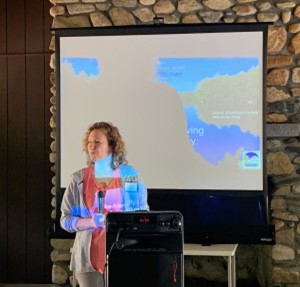 Shelly Heit, Membership Chair, explained our new online payment platform that is replacing PayPal for donations and sales of tickets or participation in various events. She has volunteered to expand her responsibilities, introducing and assuming the new Board position of Fundraising Chair. Her project to create playing
Shelly Heit, Membership Chair, explained our new online payment platform that is replacing PayPal for donations and sales of tickets or participation in various events. She has volunteered to expand her responsibilities, introducing and assuming the new Board position of Fundraising Chair. Her project to create playing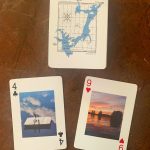 cards adorned with photos of the lake taken by members proved very successful. Packs of these cards were available to pick up at the meeting or later, at the Mountain Road Trading Post. They would also be for sale at the Trading Post and the State Park
cards adorned with photos of the lake taken by members proved very successful. Packs of these cards were available to pick up at the meeting or later, at the Mountain Road Trading Post. They would also be for sale at the Trading Post and the State Park 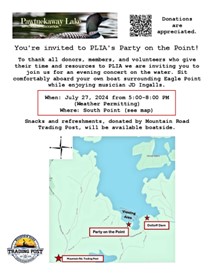 Camp Store. Shelly is organizing this year’s Paddle Poker Tournament, with the help of members Michele Lefebvre and Barb Thompson. Finally, she announced a new event to be held on the lake in late July – an open-air concert for the benefit of any and all boaters, suggested by our newest Board member Gary Potavin. She distributed flyers for the concert to all who might be interested.
Camp Store. Shelly is organizing this year’s Paddle Poker Tournament, with the help of members Michele Lefebvre and Barb Thompson. Finally, she announced a new event to be held on the lake in late July – an open-air concert for the benefit of any and all boaters, suggested by our newest Board member Gary Potavin. She distributed flyers for the concert to all who might be interested.
Board member Tom Duffy presented the Local Hero award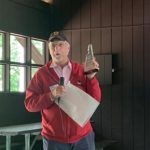 to member Barb Thomson, for her extraordinary contributions to the PLIA. Barb initiated the Paddle Poker Tournament several years ago and was its organizing genius and booster,
to member Barb Thomson, for her extraordinary contributions to the PLIA. Barb initiated the Paddle Poker Tournament several years ago and was its organizing genius and booster, 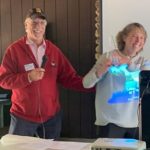 raising thousands of dollars every year. She is also a tireless member of the Milfoil Team, coordinating kayak support for milfoil extractions and often providing that support herself for last minute dives.
raising thousands of dollars every year. She is also a tireless member of the Milfoil Team, coordinating kayak support for milfoil extractions and often providing that support herself for last minute dives.
Our speaker was Nisa Marks, NH DES Watershed Coordinator and expert on cyanobacteria and the effects of pollution in NH lakes. Her presentation was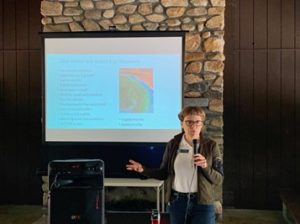 entitled “Lake-friendly Living at Pawtuckaway: Protect the Lake You Love”. She explained that cyanobacteria in particular thrive on sunshine, warm temperatures, and nutrients in lake water. Of these three, the only one we have the capacity to affect is the last one. Nutrients like phosphorus and nitrogen wash into the lake almost exclusively through stormwater runoff. Another harmful effect of runoff is soil erosion into the lake.
entitled “Lake-friendly Living at Pawtuckaway: Protect the Lake You Love”. She explained that cyanobacteria in particular thrive on sunshine, warm temperatures, and nutrients in lake water. Of these three, the only one we have the capacity to affect is the last one. Nutrients like phosphorus and nitrogen wash into the lake almost exclusively through stormwater runoff. Another harmful effect of runoff is soil erosion into the lake.
There are techniques that homeowners and lake residents can use to reduce – even eliminate – most pollution and erosion from storm runoff. Primarily, native plants growing along the shorefront are 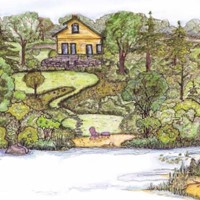 the perfect agents to filter out nutrients carried by stormwater. Rain gardens capture runoff as well. Certain grasses and soil coverings are better for capturing nutrients. Paths and driveways can be modified to allow water to drain into the subsoil rather than flow directly into the lake. And of course, septic systems can be pumped every three years and inspected for proper functioning.
the perfect agents to filter out nutrients carried by stormwater. Rain gardens capture runoff as well. Certain grasses and soil coverings are better for capturing nutrients. Paths and driveways can be modified to allow water to drain into the subsoil rather than flow directly into the lake. And of course, septic systems can be pumped every three years and inspected for proper functioning.
Nisa recommended NH DES’s Soak Up the Rain Program, https://www4.des.state.nh.us/SoakNH/ as well as NH LAKES’s LakeSmart Program, https://nhlakes.org/lakesmart/, 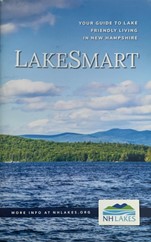 already mentioned earlier. These are comprehensive complimentary programs designed to help homeowners ensure their property is as lake-friendly as possible.
already mentioned earlier. These are comprehensive complimentary programs designed to help homeowners ensure their property is as lake-friendly as possible.
Nisa offered the following resources for our members who want to learn more about cyanobacteria: report a cyanobacteria bloom – NHDES Cyanobacteria Bloom Report Form (arcgis.com); sign up for cyanobacteria warnings – Signup Form (constantcontactpages.com) and swimming updates – Signup Form (constantcontactpages.com); and informative webinars on the subject – Cyanobacteria and Harmful Algal Bloom – YouTube.
She also had a wealth of links to online lake-friendly information: storm water erosion projects – DIY Fact Sheets – SOAK up the Rain NH (state.nh.us) and Landscaping-at-the-Waters-Edge.pdf (nhlakes.org); native and rain garden plant lists – https://nhlakes.org/wp-content/uploads/native-shoreland-plants.pdf and Native-Plants-for-NH-Rain-Gardens_20160322.pdf (state.nh.us); and webinar recording – https://www.youtube.com/watch?v=7idHxzK2rO0&list=PLzaaFQKgZ-FioCCxV22Mul9cG3H7qgFnG&index=3.
Our thanks to Nisa for an engaging and informative presentation!
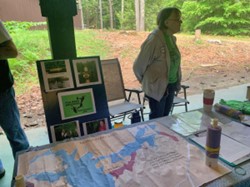
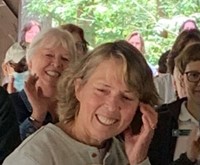 The meeting adjourned at 11:50 AM, right on time!
The meeting adjourned at 11:50 AM, right on time!
